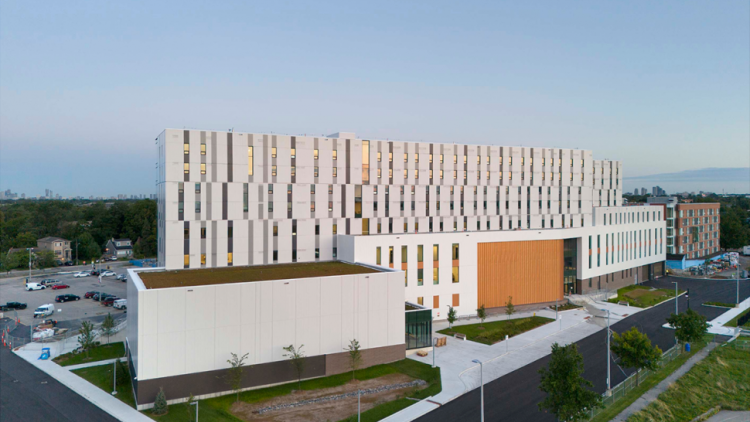Progress continues to be made on the second phase of the Humber Cultural Hub (HCH) that's slated for completion in December 2026.
Scott Valens, director, Capital Development, said a big change since the major milestone of the official opening of the new student residence in August 2024 is that the former Building A at Lakeshore Campus has been decommissioned and fully demolished.

Tom Arban photo
To help with its pursuit of LEED Platinum certification and to be a responsible environmental steward, material from Building A is being repurposed or recycled. For example, the concrete is ground down so the rebar can be separated out and recycled. That concrete is being used as fill while other materials, such as copper, are recycled.
Aman Hehar, associate director, Energy and Climate Change, said their target is for 50 per cent of the waste from the project to avoid becoming landfill and is either recycled or reused.
A key aspect of the construction of the HCH is sustainability and the building features mass timber construction sourced from renewable forests, which was used in the construction of the residence building in Phase 1 (used in the structure of the Residence AR - Phase 1). This approach captures and stores carbon, displacing traditional high-carbon building materials such as cement, brick, and steel.
Also, the building will not use any natural gas, relying instead on geothermal, solar and electricity for its energy needs.
Hehar noted that the first phase of the HCH is already being heated and cooled with geothermal and, after getting through a full season of both heating and cooling, he's pleased with how effective the system is working.
The building's geothermal system is made up of 96 boreholes, each 800 feet deep, which will generate about 70 to 80 per cent of the energy needed to heat and cool the building. An additional 30 are being dug as part of Phase 2.
Solar panels will generate another 10 per cent of the energy required meaning the building will run from 90 to 100 per cent renewable energy sources.
The HCH was named a 2024 Clean50 Top Project award winner and also won silver at the World Federation of Colleges and Polytechnics Awards of Excellence in the Construction Award category. It has also been certified under the Zero Carbon Building - Design Standard v1 by the Canada Green Building Council.
"It's rare for projects this big and complex to get the Zero Carbon Building certification," said Hehar.
The roof of Phase 1 has solar panels that came online in October 2024. The size of the system is 170 kilowatts and it generates enough electricity to offset 750,000 kilometres driven by an electric car. More solar panels are planned for the roof of Phase 2.
Valens said those who frequent the campus will see foundations and structural steel for the new building erected over the summer. As well, the 20 electric vehicle stations that were installed as part of phase one are now active and accessible.
Once completed, the HCH Phase 2 will include a new 500-seat Performance Hall as well as an Indigenous-themed classroom and an informal interior amphitheatre designed for festivals, public events, and community gatherings. There will also be classrooms for use by various Faculties, new film studios, a Comedy Cabaret and more.
More information about the project can be found by visiting the HCH website.










